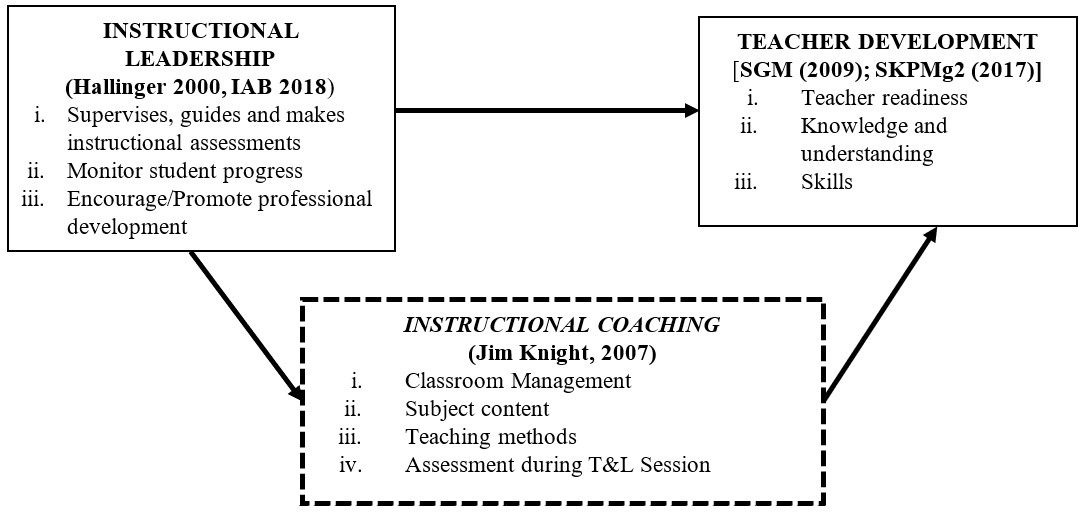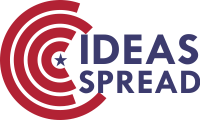The Relationship Of Instructional Leadership Towards Teachers’ Development Through Instructional Coaching Among Malaysian School Leaders
Abstract
Malaysian Education Development Plan (2013 - 2025) has outlined 11 shifts that focus on the development of the Malaysian education system. The 5th shift highlights the role of principals as instructional leaders who are responsible for bringing excellence to the organization through improving teachers' knowledge and skills within teaching and learning. Accordingly, this study aimed to identify the relationship of instructional leadership (IL) towards teacher development (TD) through instructional coaching (IC) among Malaysian school leaders. The study design is a survey method with a quantitative approach using questionnaire. Total of sample involved in this study are 1265 respondents consisting of principals and head teachers, Senior Curriculum Assistant, Head of Subject Field, Head of Subject Committee, and teachers. Samples were selected based on multi-stage cluster sampling method. Data were analysed using inferential statistics (Pearson correlation and multiple regressions). Pearson correlation test shows that the relationship between instructional leadership and instructional coaching towards teacher development is significant. Whereas multiple regression analysis shows that instructional leadership and instructional coaching were correlated and contributed significantly to teacher development.
References
Alimuddin, M. D. (2010). Ciri-ciri pengetua yang outstanding. Pendidik. Widad Publications. Selangor. Bil. 73.
Babbie, E. R. (2001). The practice of social research 9th Edition. Wadsworth Publishing & Co.Belmont, California.
Bean, R. M., & Dagen, A. S. (2012). Best Practices of Literacy Leaders: Keys to School Improvement 1st Edition. The Guilford Press. New York
Borman, J., & Feger, S. (2006). Instructional coaching: Key themes from the literature. Providence, RI: The Educational Alliance Brown University. Retrieved from http://www.alliance.brown.edu/pubs/pd/tl_coaching_lit_review.pdf
Bovalino, J. W. (2007). The role of the principal in the change process: The road to inclusion. Ed.D., University of Pittsburgh, Pittsburgh.
Chua, Y. P. (2006). Kaedah dan statistik penyelidikan; buku 1. .Kuala Lumpur.Mc Graw Hill (Malaysia) Sdn. Bhd.
Clough, M. S. (2015). The prespectives of preschool teachers on instructional coaching. UNF Graduate Theses and Dissertations. 613. Retrieved January 20th, 2019 from https://digitalcommons.unf.edu/etd/613
Cohen (1988). Statistical Power Analysis for the Behavioural Sciences (2nd Ed). Hillsdale, NJ: Lawrence Erlbaum Associates.
Creswell, J. W. (2008). Educational research; planning, conducting and evaluating quantitative and qualitative research. Third Edition. Pearson Educational International. University of Nebraska.
Denton, C. A., & Hasbrouck, J. (2009). A description of instructional coaching and its relationship to consultation. Journal of Educational & Psychological Consultation, 19(2), 150-175. https://doi.org/10.1080/10474410802463296
Devino, P., & Fitzsimons, S. (2008). Coaching effective teaching strategies. Connecticut Accountability for Learning Initiative. Retrieved from http://www.sde.ct.gov/sde/cwp/view.asp?a=2618&Q=321754
Gulamhussein. A. (2013, September). Effective professional development in era of high stakes accountability. Center for Public Education.
Hallinger, P & Heck, R. H. (2003). Understanding the contribution of leadership to school improvement dalam Learning to read critically in educational leadership management. McGraw-Hill House. England.
Hallinger, P. (2000). A review of two decades of research on the principal using the Principal Instructional Management Rating Scale. Paper presented at the annual meeting of the American Education Research Association, Seattle, WA.
Hallinger, P. (2003). Leading educational change: Reflections on practice of instructional and transformational leadership. Cambridge Journal of Education, 33(3), 329-351. https://doi.org/10.1080/0305764032000122005
Hallinger, P., & Heck, R. H. (2010). Collaborative leadership and school improvement: Understanding the impact on school capacity and student learning. School Leadership and Management, 30(2), 95-110. https://doi.org/10.1080/13632431003663214
Hallinger, P., & Murphy, J. (1985). Assessing the instructional leadership behavior of principals, Elementary School Journal, 86(2), 217-248. https://doi.org/10.1086/461445
Hatch, T. (2009). Managing to change: How schools can survive (and sometimes thrive in turbulent times). New York.Teachers College, Columbia University.
Havlik, K. M. (2007). Leadership, learning and school change: The elementary principal’s role in teacher professional development. Thesis PhD, University of Wincosin. Retrieved from https://edorigami.wikispaces.com/21stcenturypedagogy/
Hussein Mahmood. (2005). Kepimpinan beretika dan bermoral dalam penambahbaikan sekolah. Kertas kerja Seminar Nasional Pengurusan dan Kepimpinan Pendidikan ke -14. Institut Aminuddin Baki. Genting Highlands.
Ikhsan dan Daniel (2012). Corak Aliran Penyoalan Lisan Guru Dalam Proses Pengajaran bagi Tajuk Elektrokimia. Jurnal Pendidikan Malaysia 37 (1) (2012), 57-67.
Institut Aminuddin Baki. (2018). Standard keperibadian dan amalan pemimpin pendidikan berprestasi tinggi. IAB. Enstek.
Isaacs, J., & Magnuson, K. (14 Disember 2011,). Income and education as predictors children’s school readiness. Social Genome Project Research. Retrieved from http://www.brookings.edu/research/reports/2011/12/15-school-readiness-isaacs
Jacobs, J., Boardman, A., Potvin, A., & Wang, C. (2018). Understanding Teacher Resistance to Instructional Coaching. Professional Development in Education, 44(5), 690-703. https://doi.org/10.1080/19415257.2017.1388270
Jafri, A. (2010). Pelaksanaan penempatan guru mengikut tugas dan kepuasan kerja di Sekolah Menengah Kebangsaan di Malaysia. Tesis Dr. Fal, Fakulti Pendidikan. Universiti Kebangsaan Malaysia. Bangi.
Jainabee, M. K. (2005). Budaya organisasi dan kepuasan kerja di Maktab Perguruan Malaysia. Tesis Dr. Fal. Fakulti Pendidikan. Universiti Kebangsaan Malaysia. Bangi.
Jamelaa, B. A. (2012). Amalan kepimpinan instruksional dan sikap terhadap perubahan dalam kalangan pengetua sekolah menengah di Negeri Pahang. Tesis Dr. Fal. Bangi. Fakulti Pendidikan, Universiti Kebangsaan Malaysia
James, A. J. E., & Balasandran, R. (2009). Kepimpinan Instruksional. Satu Panduan Praktikal. Kuala Lumpur: PTS Professional.
Jemaah Nazir dan Jaminan Kualiti (2010). Laporan SKPM. Retrieved January 28th, 2019 from http://wbgfiles.worldbank.org/documents/hdn/ed/saber/supporting_doc/EAP/Teachers/Malaysia/DOKUMEN%20SKPM%202010.pdf
Jemaah Nazir dan Jaminan Kualiti (2014). Bengkel pemantapan program pemantapan pembelajaran dan pengajaran menggunakan standard 4 dan video e-guru. Retrieved January 20th, 2019 from http://ppdbp.edu.my/v3/index.php/.../pengurusan.../kualiti/39...guru/file
Jemaah Nazir dan Jaminan Kualiti. (2011). Dapatan pemeriksaan bertema verifikasi penarafan kendiri sekolah. Jabatan Pelajaran Negeri Pahang. Kuantan.
Jones.G (2018). Evidence-based School Leadership and Management: A practical guide. SAGE Publication Sdn. Bhd. London.
Joyce, B., & Showers, B. (1980). Improving inservice training: The messages of research. Educational Leadership, 37(5), 379-385.
Kementerian Pelajaran Malaysia. (2010). FAQs program pembangunan prestasi sekolah. Lampiran Informasi Am.
Kementerian Pendidikan Malaysia. (2009). Standard Guru Malaysia. Kementerian Pendidikan Malaysia: Putrajaya.
Kementerian Pendidikan Malaysia. (2017). Standard Kualiti Pendidikan Malaysia gelombang 2. Retrieved January 20th, 2019 from https://www.moe.gov.my/index.php/my/arkib/pemberitahuan/2018/4183- skpmg2-2018
Knight, J. (2007). Instructional coaching; A partnership approach to improving instruction. Corwin Press. Thousand Oaks, California Laporan awal Pelan Pembangunan Pendidikan Malaysia 2013-2025. (2012). Kementerian Pelajaran Malaysia.
L’Allier, S., Elish-Piper, L., & Bean, R. (2010). What matters for elementary literacy coaching? Guiding principles for instructional improvement and student achievement. The Reading Teacher, 63(7), 544-554. https://doi.org/10.1598/RT.63.7.2
Lambert, L. (2002). A framed worked for shared leadership. Educational Leadership, 59(8), 37-40. https://doi.org/10.1002/bl.59
Lee, K. A. (2015). The influence of collective instructional leadership on teacher efficacy. Lee, Theses and Dissertations--Educational Leadership Studies. 12. Retrieved January 20th, 2019 from https://uknowledge.uky.edu/edl_etds/12
Maimunah, M. (2005). Kepimpinan situasi di kalangan pengetua sekolah di Malaysia. Tesis Dr. Fal, Fakulti Pendidikan, Universiti Kebangsaan Malaysia.
Marks, H. M., & Printy, S. M. (2003). Principle leadership and school performance: an integration of transformational and instructional leadership. Educational Administration Quarterly, 39(3), 370-394.
Marzano, R. J. (2003). What works in schools: Translating research into action. Alexandria, VA: Association for Supervision and Curriculum Development.
McCombs, J., & Marsh, J. (2009). Lessons for boosting the effectiveness of reading coaches. Phi Delta Kappa, 90, 501-508. https://doi.org/10.1177/003172170909000710
McEwan, E. (2002). Seven Steps to Effective Instructional Leadership. California:Corwin Press, Inc. https://doi.org/10.4135/9781483328775
McGuire, C. K., & Vivian, W. (2008). Policy, Leadership, and Student Achievement: Implications for Urban Communities. USA: Information Age publishing.
Miller, K. (November 2003). School, teacher, and leadership impacts on student achievement. Mid-continent Research for Education and Learning Policy Brief. Retrieved from http://www.bradthiessen.com/html5/m340/4i%20Marzano.pdf
Mohamad Said dan Alias (2013). Kreativiti Pengajaran Guru Sekolah Rendah di Malaysia. Jurnal Psikologi Malaysia, 27(2013), 71-97.
Mohd, Y., & Mohd, F. (2016). Kesediaan guru sekolah menengah mengamalkan pengajaran abad ke-21. Masters thesis, Universiti Tun Hussein Onn Malaysia Vanneman, A., Hamilton, L., Anderson, J., & Rahman, T. (2009, July). Achievement gaps: How black and white students in public schools perform in mathematics and reading on the national assessment of educational progress. Washington, DC: U. S. Department of Education National Center for Education Statistics.
Mortimore, P. (1997). Can all schools be successful? An exploration of the determinants of school ‘success’. Paper presented at the British Educational Research Association Annual Conference (September 11-14 1997: University of York)
Neufeld, B., & Roper, D. (2003). Coaching: A strategy for developing instructional capacity—promises and practicalities. Institute Program on Education and the Annenberg Institute for School Reform. Washington, DC: Aspen.
Noor Lela Ahmad & Hazianti Abdul Halim dan Hariyati Ab Wahid. (2014). Amalan pembangunan professional (LDP) dalam kalangan guru sekolah menengah daerah Manjung. Retrieved January 20th, 2019 from https://www.researchgate.net/publication/310440830
Oppenheim, A. N. (2005). Questionnaire design, interviewing and attitude measurement : New edition. Pinter Publications: New York.
Pelan Induk Pembangunan Pendidikan 2006-2010. (2007). Kementerian Pelajaran Malaysia.
Pelan Pembangunan Pendidikan Malaysia 2013-2025. (2012). Kementerian Pelajaran Malaysia.
Rahimah Haji Ahmad. (2005). Kepengetuaan dan kepemimpinan sekolah: Pembangunan dan penambahbaikan pengajaran. Jurnal Pemimpin, 5, 1-10.
Reed, M. J. (2015). An Explanatory Mixed-Methods Study of How Classroom Teachers Perceive Instructional Coaching at an Urban High School in Pennsylvania. Thesis Dr. of Education. Drexel University. Philadephia.
Robinson, V. M. J., Lloyd, C. A., & Rowe, K. J. (2008). The impact of leadership on student outcomes: An analysis of thedifferential effects of leadership types. Educational Administration Quarterly, 44(5), 635-674. https://doi.org/10.1177/0013161X08321509
Sekaran, U. (2003). Research methods for business: a skill building approach. John Wiley & Sons. Singapore.
Siti Norbaini Abdul Halim. (2015). Faktor-faktor kegagalan latihan dalam organisasi. Tesis Sarjana Muda. Fak. Sains Kognitif dan pembangunan Manusia. Universiti Malaysia Sarawak.
Siti Nur Aisya dan Zabidi (2017). Kepelbagaian jenis latihan dalam perkhidmatan dan peningkatan profesionalisme guru berdasarkan kelayakan akademik Sub-Tema: Pendidikan Guru (Pembangunan Profesionalisme Guru). Retrieved January 28th, 2019 from http://eprints.um.edu.my/id/eprint/16788
Taufani, C. K., Ipong, D., Yayah, R., Zuraidah, A., Aan Komariah, & Dedy, A. K. (2020). Comparative Study on the Relationships Between Teacher Learning and Teacher Professional Development in Indonesia and Malaysia. International Journal of Innovation, Creativity and Change, 12(5), 451-466.
Vanderburg, M., & Stephens, D. (2010). The impact of literacy coaches: What teachers value and how teachers change. The Elementary School Journal, 111(1), 142-163. https://doi.org/ 0013-5984/2010/11101-0007
Walpole, S., McKenna, M., Uribe-Zarain, X., & Lamitina, D. (2010). The relationship between coaching and instruction in the primary grades: Evidence from high poverty schools. The Elementary School Journal, 111(1), 115-140. https://doi.org/10.1086/653472
Wood, K. (2013). A design for teacher education based upon a systematic framework of variation to link teaching with learners’ ways of experiencing the object of learning. International Journal of Lesson and Learning Studies, 2(1), 56-71. https://doi.org/10.1108/20468251311290132
Yeo dan Abdul Halim (2010). Pengajaran Sains dan Matematik dalam Bahasa Inggeris. Universiti Teknologi Malaysia. Tesis Sarjana.


This work is licensed under a Creative Commons Attribution 4.0 International License.
Copyright for this article is retained by the author(s), with first publication rights granted to the journal.
This is an open-access article distributed under the terms and conditions of the Creative Commons Attribution license (http://creativecommons.org/licenses/by/4.0/).








1.png)

















